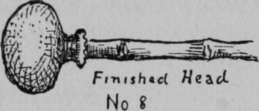XI. Games For The Camp
Description
This section is from the book "The Book Of Woodcraft", by Ernest Thompson Seton. Also available from Amazon: The Book of Woodcraft.
XI. Games For The Camp
Interesting Pursuits
I HAVE always taken the ground that interest is as essential to exercise as relish is to digestion. And for this reason have no use for the Indian clubs or dumbbells. An ideal exercise is in the open air, employing not only every member vigorously - not violently - but also the faculties including the great coordinating power that is the crowning gift of the athlete - the power to make all parts play the game in the measure needed to secure the best total result.
How needful is it then to have interesting pursuits that inspire the Scout to do and be his very best.
The appeal to the imagination that is assumed by such games as Spear-throwing and Dispatch-runner is the greatest and most elevating of all. Without some such magical power, no fellow really does the best that is in him. It makes a live wire of every fibre in his make-up.
Tilting Spears
A simple and useful part of the patrol outfit that should be made ready before going into camp is a supply of tilting-spears. I have seen a good many campers try tilting in the water or on the land, and make an utter failure of it, by reason of the absurdly clumsy, heavy spears used. A green sapling was cut for handle, and the end tied up in a bundle of rags that was 18 inches through. This was hard enough to lift, when dry, and as it usually soon fell into the water, and got sopping wet, its weight became trebled, and one could not use it as a spear at all.
The correct spears always used in our camps are made thus: Take 8 feet of the butt-end of an ordinary bamboo fishing-rod - or, if anything, a little heavier than ordinary. Get a 2-inch plank of any light wood, and from this cut a disk 3 inches across, bevel off and round the edges. Bore a hole (about 3/4 inch) in the middle, Now pad the head an inch thick with the ordinary horsehair stuffing that is used in furniture, and bind all with strong burlap, sewing it at the seams, and lashing it around the bamboo with string (No. 8). This completes the dry land spear. If for use in the water, make a final cover out of rubber cloth. This keeps the spear dry. A completed spear weighs about 1 1/2 lbs.
Each band should have a half-dozen of these spears. They serve a number of purposes, some of them quite different from that originally intended.
When used in the water, the ordinary rules of canoe-tilting are followed. Each spearman stands in the bow of his boat, on the bow-seat. His crew bring him within and put this on the top of the bamboo, so that it sets against a shoulder or knot. Drive a circular plug in the hollow of the bamboo for a wedge, and make all secure with one or two very thin nails driven in (No. 7) feet of his rival, and now he endeavors to put him overboard. Points are reckoned thus:


TILTING IN THE water.
Forcing your enemy to put one foot down off the seat........5
Forcing your enemy to put two feet down off the seat........10
Forcing your enemy on one knee ... 5 Forcing your enemy down on two knees 10 Forcing your enemy to lose his spear . 10 Forcing your enemy overboard . . 25
It is a foul to strike below the knee, or to use the spear as a club.
The umpire may dock up to 25 points for fouls.
When canoes are used, the spearman stands on the bottom, so all points are by loss of spear, or by going overboard.
Continue to:
- prev: Camp Cookery
- Table of Contents
- next: Tub Tilting On Land
Tags
bookdome.com, books, online, free, old, antique, new, read, browse, download
